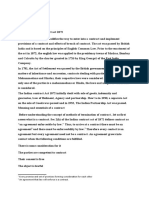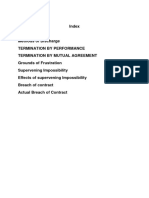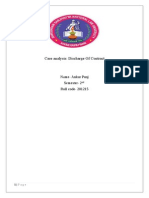The Law of Contracts Forms A Substantial Part of Our Various Relationships That Can Have Some Sort of Influence Over Us On An Almost Daily Basis
The Law of Contracts Forms A Substantial Part of Our Various Relationships That Can Have Some Sort of Influence Over Us On An Almost Daily Basis
Uploaded by
Narmatha Mani MaranCopyright:
Available Formats
The Law of Contracts Forms A Substantial Part of Our Various Relationships That Can Have Some Sort of Influence Over Us On An Almost Daily Basis
The Law of Contracts Forms A Substantial Part of Our Various Relationships That Can Have Some Sort of Influence Over Us On An Almost Daily Basis
Uploaded by
Narmatha Mani MaranOriginal Description:
Original Title
Copyright
Available Formats
Share this document
Did you find this document useful?
Is this content inappropriate?
Copyright:
Available Formats
The Law of Contracts Forms A Substantial Part of Our Various Relationships That Can Have Some Sort of Influence Over Us On An Almost Daily Basis
The Law of Contracts Forms A Substantial Part of Our Various Relationships That Can Have Some Sort of Influence Over Us On An Almost Daily Basis
Uploaded by
Narmatha Mani MaranCopyright:
Available Formats
1. WHEN A CONTRACT COULD BE DISCHARGED?
DISCUSS
When an agreement, which was binding on the parties to it, ceases to bind them, the contact is
said to be discharged. A contract may be discharged in the following ways:
1. By Performance of the contract ;
2. By breach of the contract ;
3. By impossibility of performance ;
4. By Agreement.
DISCHARGE BY PERFORMANCE
Under a contract each party is bound to perform his part of the obligation. After the parties have
made due performance of the contract, their liability under the contract comes to an end. In such
a case the contract is said to be discharged by performance.
DISCHARGE BY BREACH OF CONTRACT
When a party having a duty to perform a contract fails to do that, or does an act whereby the
performance of the contract by him becomes impossible, or he refuses to perform the contract,
there is said to be a breach of contract on his part. On the breach of contract by one party, the
other party is discharged from his obligation to perform his part of the obligation, and he also
gets a right to sue the party making the breach of contract for damages for the loss occasioned
to him due to the breach of contract. The breach of contract may be either actual, i.e., non-
performance of the contract on the due date of performance, or anticipatory, i.e., before the due
date of performance has come. For example, A is to supply certain goods to B on 1st January.
On 1st January A does not supply the goods. He has made actual breach of contract. On the
other hand, if A informs B on 1st December that he will not perform the contract on 1st January
next, A has made anticipatory breach of contract.
a. Anticipatory Breach Of Contract
It means the repudiation of a contract by one party to it before the due date of its performance
has arrived. Section 39, which contains law relating to anticipatory breach of contract is as
follows: When a party to a contract has refused to perform, or disabled himself from
performing, his promise in its entirety, the promisee may put an end to the contract, unless he
has signified, by words or conduct, his acquiescence in its continuance. Anticipatory breach of
contract could be made by promisor, either by refusing to perform the contract, or disabling
himself from performing the contract in its entirety, before the due date of performance has
arrived. When the refusal to perform the contract in its entirety is not there, it is not to be
considered to be a case of anticipatory breach within the meaning of section 39.
b. Effect Of Anticipatory Breach Of Contract
When the promisor has made anticipatory breach of contract, the promisee may put an end to
the contract, unless he has signified by words or conduct his acquiescence in its continuance. It
means that on the breach of contract by one party, the other party has two alternatives open to
him, viz.,
(i) He may rescind the contract immediately, i.e., he may treat the contract as an end, and may
bring an action for the breach of contract without waiting for the appointed date of the
performance of the contract,
(ii) He may not put an end to the contract but treat it as still subsisting and alive and wait for the
performance of the contract on the appointed date.
DISCHARGE BY IMPOSSIBILITY OF PERFORMANCE
Both under the English and Indian law a contract the performance of which is impossible the
same is void for that reason. Section 56, which deals with this question, mentions two kinds of
impossibility. Firstly, impossibility existing at the time of the making of the contract. Secondly, a
contract which is possible ofperformance and lawful when made, but the same becomes
impossible or unlawful thereafter due to some supervening event.
DISCHARGE BY AGREEMENT
There is nothing preventing parties to a contractual relationship to vary or discharge the
agreement, and can do so in the following ways:
Mutual discharge: is where both parties agree to release one another from what was
agreed upon before either party has performed any of the acts promised.
Release by one party: is where one party has completed their contractual promise, and
agrees to release the other party from further performance of the contract.
Novation: putting a new contract in place of the old one and can be done between the
original contracting parties or different parties.
Merger of lesser agreement into a greater agreement: is where parties to a simple
contract enter into a formal contract or deed, and the simple contract has been merged
by the formal contract which has become enforceable. Merger may also operate in such
a way where the obligations under the agreement will have the effect of discharge.
Discharge by accord and satisfaction: arises where one party is in breach of the
contractual agreement and the other party agrees to release the party who is in breach
by requiring performance of another promise, which would then mean that the previous
agreement has been discharged by accord (the new promise) and satisfaction
(performance).
Waiver of a contract: is where the strict performance of the contract is no longer
required, even though strict performance of the contractual agreement can still be
claimed by one of the parties.
DISCHARGE OF A CONTRACT BY FRUSTRATION
There may instances where performance of the contract is impossible and it isnt the fault of any
of the parties that there are no provisions dealing with a circumstance arisen, therefore, allowing
the parties to be released from further performance of the contract.
Frustration as a concept can be difficult to define and the test of frustration was stated by Lord
Radcliffe inDavis Contractors Ltd v Fareham Urban District Council [1956] AC 696, and
approved by the High Court of Australia in Codelfa Construction Pty Ltd v State Rail Authority of
New South Wales (1982) 149 CLR 336.
Lord Radcliffe in reference to the test of frustration stated:
frustration occurs whenever the law recognises that without default of either party a
contractual obligation has become incapable of being performed because the circumstances in
which performance is called for would render it a thing radically different from that which was
undertaken by the contractit was not this that I promised to do.
His Lordship further observed the importance in regards to unexpected events in terms of
frustration by stating: There must be as well such a change in the significance of the obligation
that the thing undertaken would, if performed, be a different thing from that contracted for.
Alternatively, there are three limitations to the doctrine of frustration:
the frustrating event was not caused by either party to the contract;
the frustrating event must not be one where it was reasonably foreseeable or
contemplated by either party;
the occurrence of the frustrating event was not caused by the party who is seeking to
rely on frustration.
Under the common law, a contract which is frustrated automatically comes to an end, however,
any liabilities prior to the frustrating event may still be enforceable but in terms of future
obligations (termination in futuro), the parties will be discharged.
You might also like
- A Diversed Worforce Is Becoming A Norm in Most Companies in MalaysiaDocument9 pagesA Diversed Worforce Is Becoming A Norm in Most Companies in MalaysiaNarmatha Mani Maran83% (6)
- Discharge of A Contract Dr. KiworyDocument26 pagesDischarge of A Contract Dr. KiworyRwaki Donatus100% (1)
- Discharge of ContractDocument37 pagesDischarge of ContractSunita Verma100% (1)
- VDA de Nueca V Manila RailroadDocument2 pagesVDA de Nueca V Manila RailroadPio Guieb Aguilar50% (2)
- Motion To Declare Defendant in DefaultDocument3 pagesMotion To Declare Defendant in DefaultTauMu Academic100% (1)
- Emergency Injunction Michelle Hansen 20140324Document102 pagesEmergency Injunction Michelle Hansen 20140324albtros100% (2)
- Fedman Development Corp Vs Agcaoili CivProDocument3 pagesFedman Development Corp Vs Agcaoili CivProcrystalNo ratings yet
- Lawyers Cooperative V TaboraDocument2 pagesLawyers Cooperative V Taboraernestadarna100% (1)
- Peoria County Booking Sheet 06/05/13Document12 pagesPeoria County Booking Sheet 06/05/13Journal Star police documentsNo ratings yet
- Rescission of Contracts - 1Document12 pagesRescission of Contracts - 1Chudap Cell Inc.No ratings yet
- Contract Presentation Group 3Document9 pagesContract Presentation Group 3ifeanaonwukosisoNo ratings yet
- C6 Discharge and Remedies of ContractDocument3 pagesC6 Discharge and Remedies of ContractShashwat JhaNo ratings yet
- Discharge of ContractDocument20 pagesDischarge of ContractUtkarsh SethiNo ratings yet
- Discharge of A ContractDocument34 pagesDischarge of A ContractApm MabulaNo ratings yet
- Discharge of ContractDocument4 pagesDischarge of Contractgoon baboonNo ratings yet
- Discharge of Contract FINALDocument6 pagesDischarge of Contract FINALRavikant SharmaNo ratings yet
- Discharge of ContractDocument10 pagesDischarge of ContractAkash Sharma100% (1)
- Week 6 Slides (Upsa)Document31 pagesWeek 6 Slides (Upsa)BISMARK ANKUNo ratings yet
- Termination of ContractDocument28 pagesTermination of ContractsteNo ratings yet
- DischargeDocument69 pagesDischargeJoseph JohnNo ratings yet
- Contract I (1) - 240110 - 115736Document39 pagesContract I (1) - 240110 - 115736sachindevllbNo ratings yet
- 2.contract LawDocument28 pages2.contract LawShafiq ShajaNo ratings yet
- Discharge of Contract Lecture NotesDocument8 pagesDischarge of Contract Lecture NotesSazzad Hossain100% (1)
- Discharge of ContractDocument8 pagesDischarge of Contractareal alphaNo ratings yet
- Termination of ContractDocument7 pagesTermination of ContractManikant SinghaniaNo ratings yet
- DISCHARGE OF CONTRACT Blabla..Document15 pagesDISCHARGE OF CONTRACT Blabla..HapsahUttek0% (1)
- Discharge of ContractDocument3 pagesDischarge of ContractAhammed JifriNo ratings yet
- Unit 2 Discharge of Contract: StructureDocument17 pagesUnit 2 Discharge of Contract: StructuregaardiNo ratings yet
- Module 7 - 21.10.2019 To 7.11.2019Document13 pagesModule 7 - 21.10.2019 To 7.11.2019Rishabh aryaNo ratings yet
- 1.discharge of ContractDocument28 pages1.discharge of ContractImran AhmedNo ratings yet
- Before Understanding The Concept of Methods of Termination of Contract, Let Us FirstDocument14 pagesBefore Understanding The Concept of Methods of Termination of Contract, Let Us FirstrohanNo ratings yet
- Discharge of ContractDocument17 pagesDischarge of ContractatreNo ratings yet
- Contract 3 - 4 SumanthDocument41 pagesContract 3 - 4 Sumanthskhan skhanbirNo ratings yet
- S7 Worksheet Biz LawDocument3 pagesS7 Worksheet Biz LawAndreas WiliaNo ratings yet
- Dischargeofcontract NewDocument29 pagesDischargeofcontract NewSyeda Ayesha TabassumNo ratings yet
- 824 1stDocument3 pages824 1stziabuttNo ratings yet
- Discharge of ContractDocument6 pagesDischarge of Contracthamzah Abdulqaadir MaiNo ratings yet
- Discharge of ContractsDocument7 pagesDischarge of ContractsNITUL BORAHNo ratings yet
- Rescission of ContractsDocument5 pagesRescission of ContractsChudap Cell Inc.No ratings yet
- Subject Code 303Document17 pagesSubject Code 303Chatan GiriNo ratings yet
- DischargeDocument11 pagesDischargeSony DonthuNo ratings yet
- Bus Law Assgnmt 2Document4 pagesBus Law Assgnmt 2Hogo DewenNo ratings yet
- Various Modes of Discharging of A Contract Various Modes of Discharging of A ContractDocument5 pagesVarious Modes of Discharging of A Contract Various Modes of Discharging of A ContractIranzi Fabrice100% (7)
- Remedies For Breach ContractsDocument11 pagesRemedies For Breach ContractsShashank Pathak100% (1)
- Discharge of ContractDocument15 pagesDischarge of ContractVikram DevilNo ratings yet
- Discharge of ContractsDocument16 pagesDischarge of ContractsEmJayMalhiNo ratings yet
- Performance of Contract: Offer To PerformDocument21 pagesPerformance of Contract: Offer To PerformsarahrahulNo ratings yet
- Business Law - Unit1Document13 pagesBusiness Law - Unit1DrKhushboo KumarNo ratings yet
- Law of Contract 3Document17 pagesLaw of Contract 3Akram KaladiaNo ratings yet
- Bus LawDocument9 pagesBus LawSohil KisanNo ratings yet
- Lab Assignment: Karan KapoorDocument4 pagesLab Assignment: Karan KapoorkaranNo ratings yet
- MistakeDocument8 pagesMistakemgtduNo ratings yet
- Essay On ContractsDocument6 pagesEssay On ContractsKosoko KamarNo ratings yet
- Pakistani Version Contract Act 1872Document39 pagesPakistani Version Contract Act 1872Muhammad Zeshan Laang100% (1)
- Discharge of A ContractDocument8 pagesDischarge of A ContractHarshita BishtNo ratings yet
- Discharge of Contract Lecture NotesDocument9 pagesDischarge of Contract Lecture NotesFredy MsamiatiNo ratings yet
- FinlTypes of ContractsDocument27 pagesFinlTypes of ContractsYatin MundejaNo ratings yet
- Business Regulations Notes: Elements of A ContractDocument19 pagesBusiness Regulations Notes: Elements of A ContractFa DreamsNo ratings yet
- Recession of ContractsDocument10 pagesRecession of ContractsVarun Oberoi100% (3)
- Lecture 14Document5 pagesLecture 14adeelkhan17.akNo ratings yet
- 2018 LEGL1001 Notes Week 9Document12 pages2018 LEGL1001 Notes Week 9Jia Wei MiaoNo ratings yet
- Contract DocumentDocument32 pagesContract DocumentTroeeta BhuniyaNo ratings yet
- Contract Projects Discharge of Contract - OdtDocument12 pagesContract Projects Discharge of Contract - Odtilyanaaishwaryakiran100% (1)
- Discharge of ContractsDocument43 pagesDischarge of ContractsBANUPRAKASH Y ANo ratings yet
- Discharge of Contracts: Discharge by Performance (Section 39-55)Document24 pagesDischarge of Contracts: Discharge by Performance (Section 39-55)LegionalbladeNo ratings yet
- Chapter 11 Discharge and Breach Review Questions (Answers)Document5 pagesChapter 11 Discharge and Breach Review Questions (Answers)Wenli FuNo ratings yet
- ConclusionDocument2 pagesConclusionNarmatha Mani Maran50% (2)
- Presentation 1Document5 pagesPresentation 1Narmatha Mani MaranNo ratings yet
- Kod BinariDocument2 pagesKod BinariNarmatha Mani MaranNo ratings yet
- Declaration Form: Prepared by Ourselves in Our Own Words and We Did Not Copy or Plagiaries Any PartDocument1 pageDeclaration Form: Prepared by Ourselves in Our Own Words and We Did Not Copy or Plagiaries Any PartNarmatha Mani MaranNo ratings yet
- Timetable 1Document3 pagesTimetable 1Narmatha Mani MaranNo ratings yet
- References: Change in The Post-Kyoto World. New York: Cambridge University PressDocument2 pagesReferences: Change in The Post-Kyoto World. New York: Cambridge University PressNarmatha Mani MaranNo ratings yet
- A) in Your Opinion, What Are The Three Most Common Reason Why Communication May Fail? Justify Your Answer by Giving Real Life Examples To Each BenefitDocument11 pagesA) in Your Opinion, What Are The Three Most Common Reason Why Communication May Fail? Justify Your Answer by Giving Real Life Examples To Each BenefitNarmatha Mani MaranNo ratings yet
- Discuss and Illustrate HR'S Role in The Strategic Planning ProcessDocument3 pagesDiscuss and Illustrate HR'S Role in The Strategic Planning ProcessNarmatha Mani MaranNo ratings yet
- What Is Definition of 'Contract of Sale of Goods' Under The Law?Document2 pagesWhat Is Definition of 'Contract of Sale of Goods' Under The Law?Narmatha Mani MaranNo ratings yet
- Unit 5Document12 pagesUnit 5جاين شاكوNo ratings yet
- Banez Vs ValdevillaDocument2 pagesBanez Vs ValdevillaPatrizia Ann FelicianoNo ratings yet
- People V CabarenoDocument9 pagesPeople V CabarenoArtemis HoltNo ratings yet
- Case Digest (Habeas Corpus) Spec ProDocument29 pagesCase Digest (Habeas Corpus) Spec ProLemuel Angelo M. Eleccion100% (4)
- Rescissible Contracts Case DigestDocument3 pagesRescissible Contracts Case DigestJan Re Espina CadeleñaNo ratings yet
- I. An Overview of The Criminal Litigation ProcessDocument9 pagesI. An Overview of The Criminal Litigation ProcessJOAHNNA PAULA CORPUZNo ratings yet
- Article On Henry VIII ClausesDocument17 pagesArticle On Henry VIII ClausesSandeep GolaniNo ratings yet
- Summary of CPC Case Material Cases 1-21 PDFDocument76 pagesSummary of CPC Case Material Cases 1-21 PDFShiva NarangNo ratings yet
- Bonilla v. Barcena (Req. Transition of Successional Rights)Document1 pageBonilla v. Barcena (Req. Transition of Successional Rights)Keanu RibsNo ratings yet
- CPC NotesDocument26 pagesCPC NotesShabnam67% (3)
- Sale/mortgage by A Co-Owner of The Whole PropertyDocument7 pagesSale/mortgage by A Co-Owner of The Whole PropertyJohn MenesesNo ratings yet
- Valmonte Vs CADocument3 pagesValmonte Vs CAiamchurky100% (2)
- Union Bank v. CADocument12 pagesUnion Bank v. CAcyhaaangelaaaNo ratings yet
- LClawsDocument2 pagesLClawsaypodNo ratings yet
- SMARTSDocument33 pagesSMARTSAlvin John San JuanNo ratings yet
- PERRYCARAVELI,O, Plainttff, vs. .'NO{Y KTMMEL, JOHNNY KNOXVILI,E, DAi(OTA NORTfl EIITERTAINMENT, INC., DON BARRTS. ADAI' COROIIJI, KLSC/ 97 .1,., VrCg IiAGAZTNE, IIITZ. COM. BACKHOLE PRODUCTIONS, PARAMOUNT PTCTURES UTUBES.CO}!, and DOES L Through 100, Inclusive, Defendants.Document11 pagesPERRYCARAVELI,O, Plainttff, vs. .'NO{Y KTMMEL, JOHNNY KNOXVILI,E, DAi(OTA NORTfl EIITERTAINMENT, INC., DON BARRTS. ADAI' COROIIJI, KLSC/ 97 .1,., VrCg IiAGAZTNE, IIITZ. COM. BACKHOLE PRODUCTIONS, PARAMOUNT PTCTURES UTUBES.CO}!, and DOES L Through 100, Inclusive, Defendants.Sam OwenNo ratings yet
- Appellate Practice 2015-2016. Aug 6Document6 pagesAppellate Practice 2015-2016. Aug 6raymaynardbacusNo ratings yet
- Ganga Bai Vs Vijay Kumar and Ors 09041974 SCs740020COM69324Document7 pagesGanga Bai Vs Vijay Kumar and Ors 09041974 SCs740020COM69324Rajat Mishra100% (1)
- Milagros Diaz Vs Teresita PunzalanDocument11 pagesMilagros Diaz Vs Teresita PunzalanFairyssa Bianca SagotNo ratings yet
- 12 106 115 Budi Sunanda PDFDocument10 pages12 106 115 Budi Sunanda PDFtikasusanto68No ratings yet
- OBLICON ReviewerDocument45 pagesOBLICON ReviewerabbyhwaitingNo ratings yet
- Sub Crim Exam OutlineDocument52 pagesSub Crim Exam OutlineMiguel FernandezNo ratings yet
- Newcases NegoindigestsDocument3 pagesNewcases NegoindigestsBirs BirsNo ratings yet
- Anwar Hossain Chowdhury vs. BangladeshDocument3 pagesAnwar Hossain Chowdhury vs. BangladeshRimel hossen100% (3)



































































































